October was an exciting month for awards with the winners for the Prime Minister’s Literary Awards being announced, along with other significant awards news. All this will be at the end of the post, as usual.
Orsome October!
We had 43 reviews posted this month, about the same as last month. Here are some highlights:
- Our most reviewed authors were Favel Parrett with five reviews for her latest novel There was still love, followed by Kate Murdoch and Heather Rose, each with three reviews for their novels The Orange Grove and Bruny.
- Our top reviewers were Amanda (Mrs B’s Book Reviews) with 5 reviews, Cass Moriarty (GoodReads), with 4 reviews.
- Small presses featured strongly this month, with nearly 25% of October’s reviews being published by members of the Small Press Network.
The Classics
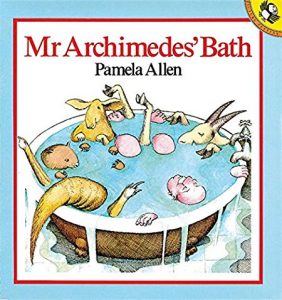 One classic was posted this month, Pamela Allen’s children’s picture book classic, Mr Archimedes’ bath. It was reviewed by Jonathan Shaw (Me fail? I fly!) as part of his Ruby Reads series of posts in which he shares the books he’s been reading with his baby (now toddler) grand-daughter. Not all the books he reads are Australian, and not all are classics, but this one, published in 1980, qualifies I believe! I love Jonathan’s brief review which includes the following:
One classic was posted this month, Pamela Allen’s children’s picture book classic, Mr Archimedes’ bath. It was reviewed by Jonathan Shaw (Me fail? I fly!) as part of his Ruby Reads series of posts in which he shares the books he’s been reading with his baby (now toddler) grand-daughter. Not all the books he reads are Australian, and not all are classics, but this one, published in 1980, qualifies I believe! I love Jonathan’s brief review which includes the following:
It was Pamela Allen’s first book, and is a kind of early version of the sublime Who Sank the Boat?, with added nakedness to compensate for the slightly less elegant narrative line.
Kids will love the nakedness I’m sure!
Small Press Network
For those of you unaware of this not-for-profit industry association, the Small Press Network describes itself as “the representative body for small and independent publishers in Australia”. They promote “independent publishing” and support “the principle of diversity within the publishing industry as a vital component of literary culture”. Members whose books were reviewed this month include Affirm Press, Fremantle Press, Giramondo Publishing, Hybrid Publishers, Scribe Publications, Text Publishing, and Transit Lounge. These publishers often publish at the more literary end of the spectrum, and so, being clichéd, can punch above their weight at awards time. They can also publish some of our more beautiful books – in design and content.
 Affirm Press, for example, published Melissa Ashley’s The bee and the orange tree, which was reviewed by Cass Moriarty. Besides telling us that the book is about the 17th century Frenchwoman Baroness Marie Catherine D’Aulnoy who apparently invented fairy-tales before the Brothers Grimm, Cass describes the book as follows:
Affirm Press, for example, published Melissa Ashley’s The bee and the orange tree, which was reviewed by Cass Moriarty. Besides telling us that the book is about the 17th century Frenchwoman Baroness Marie Catherine D’Aulnoy who apparently invented fairy-tales before the Brothers Grimm, Cass describes the book as follows:
Complete with a handful of reproductions of original black and white drawings, this book is an engrossing read and a lovely objet d’art.
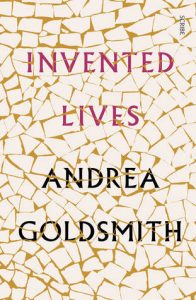 Theresa Smith reviewed Giramondo’s publication of Andrea Goldsmith’s Invented lives. It has a wonderfully evocative cover, but Smith focuses mostly on the beauty of its content, saying:
Theresa Smith reviewed Giramondo’s publication of Andrea Goldsmith’s Invented lives. It has a wonderfully evocative cover, but Smith focuses mostly on the beauty of its content, saying:
What a novel. I should warn you up front that I’ve used numerous quotes in this review. I just feel as though there are so many profound passages within this story, and who better to demonstrate the beauty of its essence than the author herself?
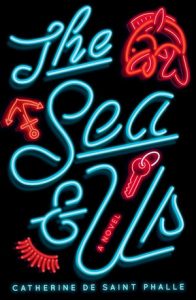 My third example – as I can’t do them all – is Transit Lounge’s The sea and us by Catherine de Saint Phalle. Cass Moriarty started her review with:
My third example – as I can’t do them all – is Transit Lounge’s The sea and us by Catherine de Saint Phalle. Cass Moriarty started her review with:
Stella shortlisted author Catherine De Saint Phalle’s latest novel The Sea and Us (Transit Lounge 2019) is a slim, beautifully produced hardback, written in spare and literary prose that mesmerises with its simplicity and directness, and the evocative ambivalence of memories and emotion.
If you haven’t sussed out some of these smaller publishers, do think about it, as they deserve our support. You can usually see the love in their production, before you even start to read the book – but their books are worth reading too!
Awards News
Several awards announcement this month …
Prime Minister’s Literary Awards
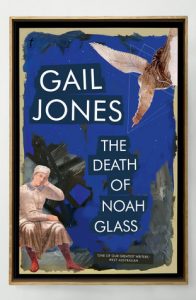 Both the shortlists and the awards were announced this month! One day these wards will run to some sort of regular schedule. These highly valuable awards saw women appearing in five of the six categories. Way to go!
Both the shortlists and the awards were announced this month! One day these wards will run to some sort of regular schedule. These highly valuable awards saw women appearing in five of the six categories. Way to go!
- Fiction: Gail Jones for The death of Noah Glass
- Nonfiction: Paul Genoni and Tanya Dalziell for Half the perfect world: Writers, dreamers and drifters on Hydra, 1955–1964
- Australian history: Meredith Lake for The Bible in Australia: A cultural history
- Poetry: Judith Beveridge for Sun music
- Children’s literature: Emily Rodda for His name was Walter
The fiction, poetry and children’s books have all been reviewed for the challenge, but not the two nonfiction books. Is anyone interested?
Readings Prize
 This is a smaller prize run by Readings bookshop in Melbourne. It was won this year by Alice Robinson for her cli-fi novel The glad shout. It has been reviewed for the challenge, just not this month!
This is a smaller prize run by Readings bookshop in Melbourne. It was won this year by Alice Robinson for her cli-fi novel The glad shout. It has been reviewed for the challenge, just not this month!
Tasmanian Premier’s Literary Awards
I’m sharing here the three main awards that are relevant to this corner of the Challenge. Half of these have yet to be reviewed for the Challenge, so again we’d be thrilled if you took up the Challenge and did them for us!
Tasmania Book Prize for the best book with Tasmanian content in any genre (3 of 4 by women)
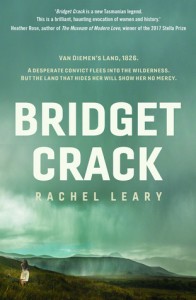 Sarah Day’s Towards light & Other poems
Sarah Day’s Towards light & Other poems - Rachel Leary’s Bridget Crack
- Danielle Wood and Ralph Crane’s Island Story: Tasmania in object and text
Margaret Scott Prize for the best book by a Tasmanian writer (1 of 4 by a woman)
- Minnie Darke’s Star-crossed
University of Tasmania Prize for the best unpublished literary work by an emerging Tasmanian writer (1 of three by a woman)
- Susie Greenhill’s The clinking
Voss Literary Prize longlist
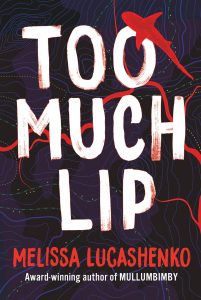 This award, which was established in 2014, saw three of the ten-strong longlist being by women.
This award, which was established in 2014, saw three of the ten-strong longlist being by women.
- Robyn Cadwallader’s Book of colours
- Gail Jones’ The death of Noah Glass
- Melissa Lucashenko’s Too much lip
All of these have been reviewed for the challenge, though only one this month, Maureen Helen’s review of Too much lip. Helen loved the book, and dot-pointed her major reasons. One of these was:
The compassionate voice of the author which pervades the novel, combined with the rawness honesty of the language throughout.
———————
About Me
I am Whispering Gums and I read, review and blog about (mostly) literary fiction. It was reading Jane Austen when I was 14 years old that turned me on to reading literary fiction/classics. Little did Jane know what she started!
My love of Aussie literature started with Banjo Paterson’s ballads and Ethel Turner’s Seven Little Australians in my childhood. But, I didn’t really discover Australian women’s writing until the 1980s when I fell in love with Elizabeth Jolley, Thea Astley, Olga Masters, Helen Garner and Kate Grenville. Ever since then I have included a good percentage of Australian (and other) women writers in my reading diet.






Thanks for the mention, Sue. This is a great round-up
Thanks Jonathan. I reclassified Allen into our Classic “genre”. Would be happy for you to do that for any pre-1990 Aussie picture book that is still out there being read.